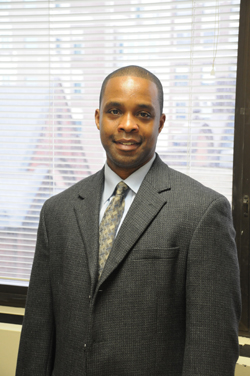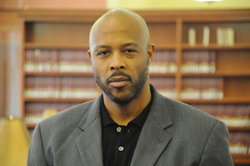New Faculty Profiles
As part of a yearlong focus on new faculty members, Inside profiles minority post-doctoral fellows Thurman Bridges and Fanon Howell.
Minority Postdoctoral Fellow, Department of Curriculum and Teaching
What do you teach?
This spring, I am teaching Pedagogies of Insurgency: Exploring Race, Class and Resistance in Education. I also teach African American Education: Examining the Major Paradigms in the Field; Embracing Diversity in Classroom Communities; and Teacher Leadership in Education.
What has been the focus of your research?
My recent work analyzes the social, educational and cultural experiences of black male K–12 teachers who were closely connected to hip hop culture and have been effective in addressing the academic and social needs of, particularly, black boys. I also conduct participatory action research with marginalized youth and seek to contextualize the schooling experiences of students who experience troubles in K–12 schools. My goal is to inform curriculum, pedagogy and school policy on conceptualizing and creating teaching and learning environments that are supportive for black male teachers and that increase the capacity of all teachers to effectively teach diverse student populations, particularly in urban schools.
What are your academic passions?
In my work as an urban teacher educator, I advocate for an educational model that awakens, among students of color, orientations towards political advocacy, educational transformation and community empowerment. It is through this model that I motivate and teach pre- and in-service teachers to enact the type of culturally relevant pedagogy that encourages urban youth to make meaning of, and fully engage in, their educational journeys, while providing them with the intellectual freedom to reimagine the ways in which public education may contribute to, rather than take away from, their development into critically conscious students.
Can you recall a memorable teaching experience, perhaps one from your early career, that has had an impact on you?
My first year as a teacher in Richmond, Virginia, I’d prepared an interactive lesson addressing the key factors contributing to the social unrest among the American colonists leading up to the Revolutionary War. For this lesson, I assembled period music, reproduced pamphlets representing the grievances of the people (Common Sense by Thomas Paine) and created work stations throughout the classroom for students to investigate the social, political and religious contexts of the that time. I was excited to facilitate the process of traveling back in time and critically investigating the causes of the war. During the first class of the day, a student asked, “Mr. Bridges, why should I care about the American Revolution when we are fighting every day just to survive? How is this going to help me in my life right now?”
That question stopped me in my tracks and forced me to think about my role as an educator and the purpose and function of public education, particularly relating to youth from vulnerable communities. His question challenged me then and continues to guide my thinking about how ineffective the schooling process has been in addressing the social, academic and emotional needs of urban youth and their families.
Fanon Howell
Minority Postdoctoral Fellow, Department of Organization and Leadership
What do you teach?
I teach urban and organizational sociology, sociology of education and social theory. This spring, I am teaching Sociology of Formal Organizations.
What has been the focus of your research?
My research focuses on the organizational change and cultural dynamics that resulted from the school reforms in New York City, particularly the shift to mayoral control and the implementation of Children First reforms. I investigate reorganizations of this school district, the regime of its public and private supporters and contractors, policy and practices of central employees, and mechanisms of school oversight and management.
What are your academic passions?
As a social theorist, I enjoy scrutinizing how institutions reflect, influence and challenge their prevailing institutional environments, as well as their relation to the ethos of their socio-historical era. I’m also deeply committed to the work of developing institutions into greater vessels for social justice.
Who has been influential in the development of your interests and/or career?
I’ve been lucky enough to study with professors who have fostered my quest for understanding, as well as an appreciation for academia. Alton Hornsby, Marcellus Barksdale and Anibal Bueno stand out particularly from Morehouse College; Robin Nagel, Levent Soysal and Michael Gomez from New York University; and Eiko Ikegami, Rachel Sherman and Andrew Arato at The New School for Social Research. I’ve also had a number of practitioners in the field of education that have been invaluable mentors, including Lucille Swarns, Gale Reeves and a host of district and school administrators in the New York City system.
Can you recall a memorable teaching experience, perhaps one from your early career, that has had an impact on you?
One of my managerial experiences in New York City involved case management with court-involved youth. Advising 20 young men and women ages 15–20, I came to understand the interconnected institutional arenas—family, legal, penal, educational, vocational—that constructed their lives and determined future possibilities. The position sparked my interest in urban youth justice and institutional theory.
Published Tuesday, Mar. 29, 2011

